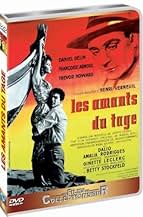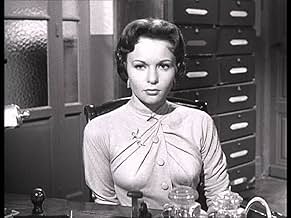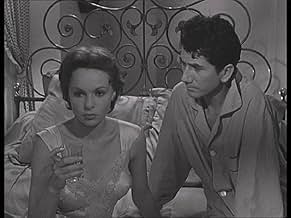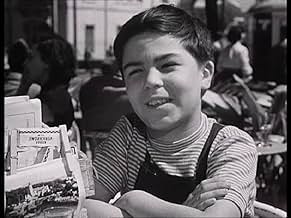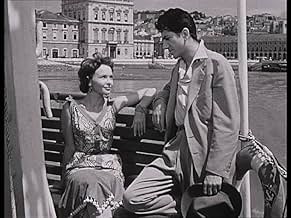He is a French taxi driver in Lisbon carrying the scars of a wife's infidelity that ended in tragedy when he found her with his lover upon returning from the war. She is a French woman in tr... Read allHe is a French taxi driver in Lisbon carrying the scars of a wife's infidelity that ended in tragedy when he found her with his lover upon returning from the war. She is a French woman in trouble with the law and she has a police inspector on her tail. They fall passionately in l... Read allHe is a French taxi driver in Lisbon carrying the scars of a wife's infidelity that ended in tragedy when he found her with his lover upon returning from the war. She is a French woman in trouble with the law and she has a police inspector on her tail. They fall passionately in love, but because of his past he is not able to trust that she is not using him to escape t... Read all
- Pierre Roubier
- (as Daniel Gelin)
- Porfirio
- (as Dalio)
- Amália
- (as Amalia Rodrigues)
- Manuel
- (as Le petit Jacques Mouliere)
- L'avocat
- (as Georges Chamarat Sociétaire de la Comédie Française)
- Petit rôle
- (uncredited)
- Alban, Françoise
- (uncredited)
- Le maître d'hôtel
- (uncredited)
- …
- Lord Dicson
- (uncredited)
Featured reviews
It is definitely worth seeing if a) you like any of the three stars, who all give good performances; b) you like films (French or otherwise) from the 1950s - this film is very much a product of its time; c) you are interested in tracing the career of the director, Henri Verneuil, best known in the English-speaking world for The Sicilian Clan (1968) with Gabin and Delon.
As I said above, I watched the film because I wanted to see what Trevor Howard was like in it. He is undoubtedly very good, even if he seems to struggle with the French dialogue on occasion. But he has a couple of very effective scenes, and the film is an under-appreciated but nonetheless important one in the development of his career.
The other stars, Daniel Gelin and Francoise Arnoul, are good too. The same cannot quite be said of Verneuil's direction, which oscillates between the effective and the overly static. There are a few too many long dialogue-driven sequences - partly the fault of Joseph Kessel's somewhat wordy script, taken from his own novel - that are unimaginatively filmed. I wonder what would have happened if a director like Becker or Clouzot had been in charge? But both the direction and the film itself really come alive in the sequences filmed outside on location in Lisbon. Not only do cast and crew seem to have been enlivened by the location shooting - a scene on a river boat, for example, is beautifully shot and acted - but the viewer also gets a pretty vivid picture of what Lisbon in the 1950s was like. The outdoor scenes are exceptionally vivid, and although there are a few too many stops for for the camera to take in "local colour" (a key facet of so many films of the period, offering the contemporary viewer a travelogue-style experience) nonetheless the location work in and of itself makes the film worth viewing.
The final points of interest are a fairly frank (for the time) depiction of sexuality, and the faint echoes of "doomed lover" romances so important in French cinema of the late 1930s. The film can be seen as a cousin of earlier films like Quai des Brumes and Hotel Du Nord.
I think that overall, if the direction and writing had been more dynamic, this would be regarded as a minor classic, and would not have languished in the relative obscurity it has done. But the actors deserve plaudits, as does the camera-work of Roger Hubert. It is also pleasing to note that Mme. Arnoul was still working as recently as 2007.
In the mid-1950s I wasn't yet conditioned to accept as a hero a guy who in his opening scene blows two people away. By his closing scene, though, I was rooting for him and his girl and hoping they would somehow win out over the implacable force of destiny.
Very gripping little movie, deserving to be seen.
Actually,the movie grows on you;it is based on a novel by Joseph Kessel ,but it recalls Georges Simenon's psychological suspense.The tortoise pace of the first third is necessary to introduce the three characters : the man (Daniel Gélin)committed a crime of passion ;the woman (Françoise Arnoul) may or may not be responsible for the death of her husband ,killed in a car crash;the private eye (Trevor Howard ,whose French was absolutely perfect:hats off!)plays cat and mouse with both of them: he was hired by the lady's wealthy family-in -law to find pieces of evidence which would prove she's a murderess.His method,which predates that of Colombo is very subtle.
All in all,this is another good movie by Henri Verneuil,the ending of which is not unlike that of "Pepe Le Moko" ,a standard reference work.
NB:Jacques Moulière ,who portrays the little boy,became a pop singer in the sixties (as Jacky Moulière) but his career was never really successful.
The story has been presented by other reviewers so I'll not touch on it but film draws you into a romance doomed from the start and with a final denouncement as strong as OOTP and TTM. Highly recommended.
Did you know
- TriviaAfter cutting over 15% of the film's length, Portuguese censors passed the film in 1955, but conservative critics attacked it even so, for lacking production values and showing too much. Manuel Pina wrote: "The word 'love' should not be used relating to this film. Love is not sensuality. In this film, 'to love' means something else, that morality prevents us to speak about."
- ConnectionsFeatured in The Art of Amália (2000)
- SoundtracksBarco Negro
(uncredited)
Music by Caco Velho, Piratini
Lyrics by David Mourão Ferreira
Performed by Amália Rodrigues
Details
- Runtime2 hours 3 minutes
- Color
- Sound mix
- Aspect ratio
- 1.33 : 1
Contribute to this page


